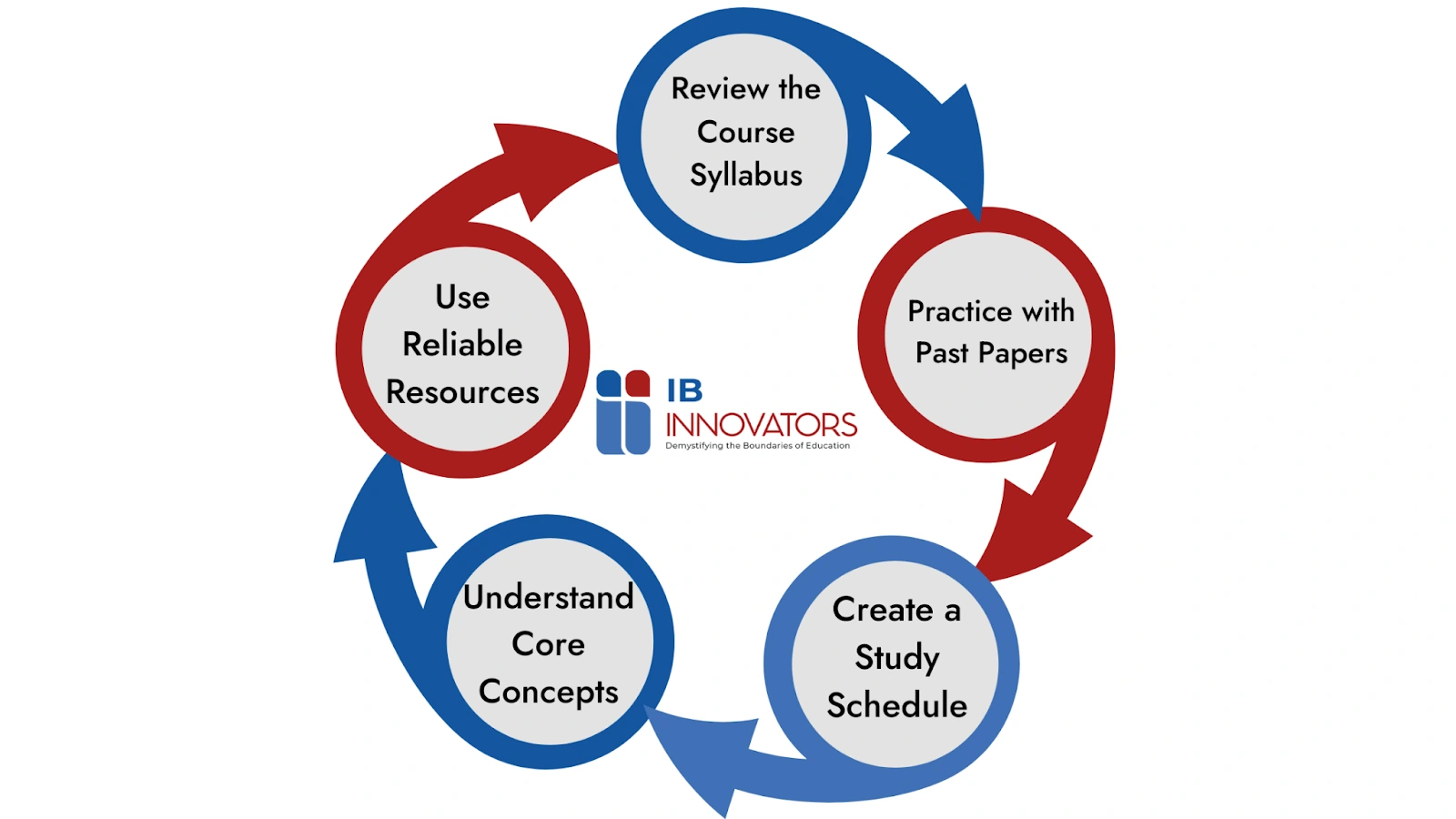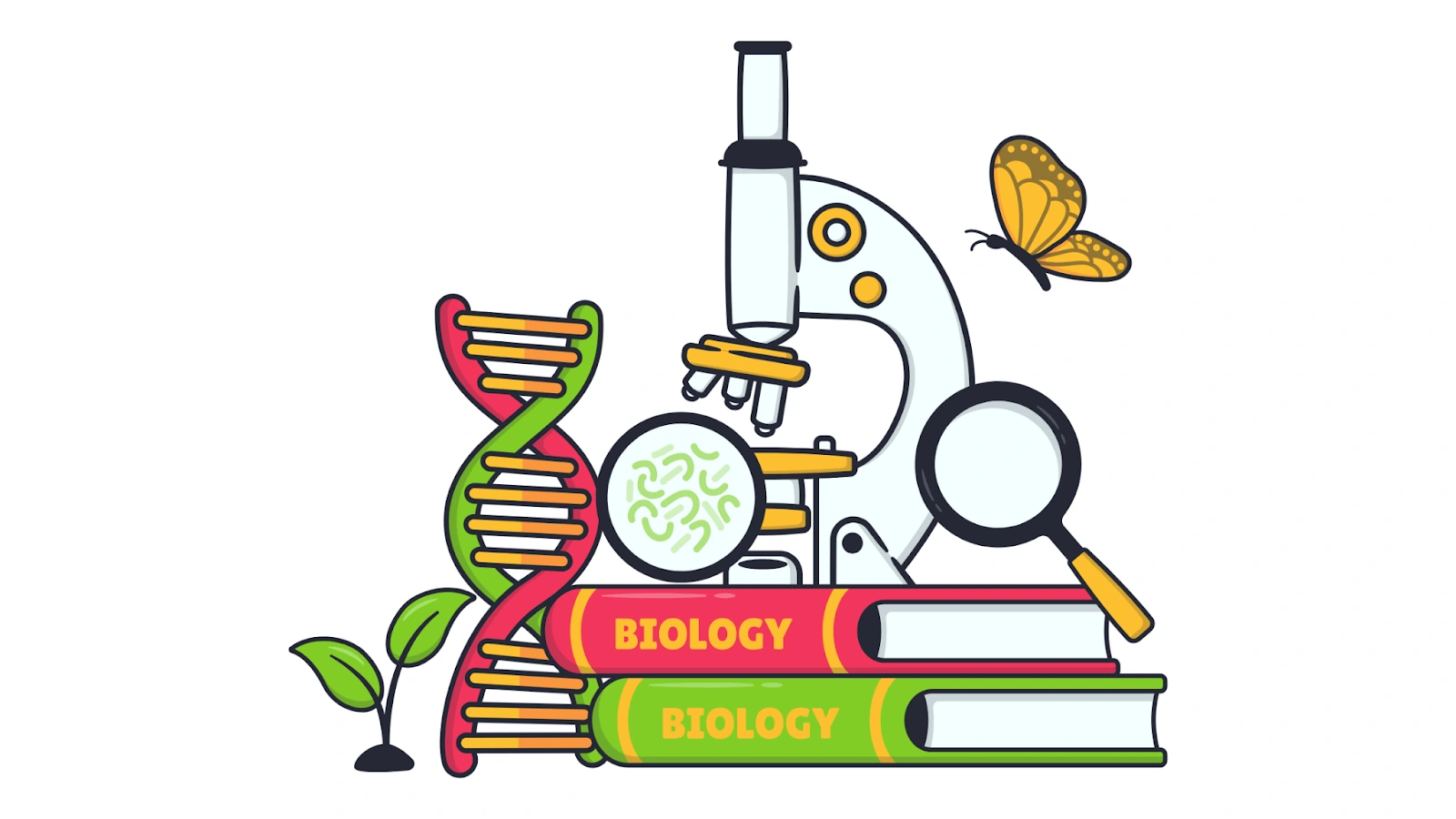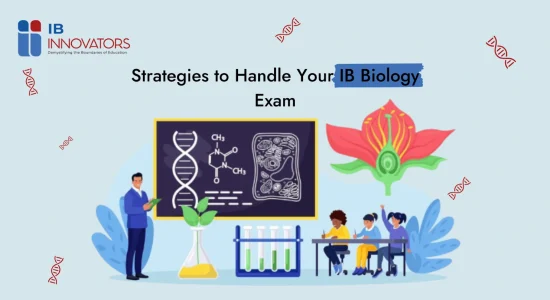The IB Biology exam is recognized for its comprehensive and challenging structure, demanding in-depth knowledge and practical skills. For IBDP students, the preparation process can often feel overwhelming.
Are you worried about balancing your IB Biology IA and exam preparation? It’s a common concern, but you can manage both efficiently with proper guidance.
In this blog, we’ll explore actionable tips designed to help you master the IBDP Biology syllabus, streamline your study process, and deliver your best performance on exam day.
Get in touch with us for IB tutoring and ace your IBDP Biology Exam with IB Innovators expert tutors!
Understanding the Structure of IB Biology Exams
It is imperative to know the structure of the exam before working on preparation. It won’t only keep you in a position to allocate your study time properly but will also keep you focused on the very integral parts of the exam.

For detailed information on the IB Biology syllabus and exam structure, you can visit here.
1. Exam Papers Breakdown
The IBDP program splits the Biology exam into three parts:
- Paper 1: Multiple-choice questions, focusing on the core topics in the IB Biology syllabus.
- Paper 2: Data-based and structured questions requiring detailed understanding and explanation.
- Paper 3: Assesses experimental knowledge and includes option-specific questions covered in the IB Biology textbook.
Each paper tests different skills, so a balanced preparation strategy is crucial.
2. Weightage and Timing
Each paper contributes differently to your final grade:
- Paper 1: 20%
- Paper 2: 36%
- Paper 3: 24%
Ensure you practice time management for each section to avoid running out of time during the exam.
Preparation Strategies to Excel in IB Biology

1. Review the Course Syllabus
The IBDP Biology syllabus serves as your path towards success in exams, with clear instructions on every concept you need to master; read it, reread it, and chop it into bits to make your study sessions focused and productive.
You can also analyze past papers to get a sense of which topics are consistently tested and therefore prioritize them during revision.
2. Use Reliable Resources
The right resources matter to prepare well; hence, invest in a detailed textbook of IB Biology that takes care of the syllabus well and expresses the concepts in plain language.
Note: Platforms like IB Innovators provide you with specific tutoring |
Combining textbooks, online resources, and expert guidance provides thorough assistance, streamlining preparation and establishing a solid base for excelling in the IB Biology exam.
For more tips, check out our IB Exam Revision: 8 Quick Tips to Refine Your Study Plan.
3. Understand Core Concepts
The IB Biology exam focuses on major topics such as cell biology, genetics, ecology, and evolution. These are the basic concepts for all three papers.
Instead of memorizing facts, try to understand principles and their applications. Practice diagram-based questions and data analysis to enhance your understanding.
FYI! For Biology HL IB, go into greater detail in areas such as biochemistry and metabolic pathways. The more you build these core concepts, the more confident you become and the better equipped you are to handle even the most complex exam questions. |
4. Create a Study Schedule
A structured timetable to guide all preparations and practices would compensate. It is good practice to devote some time to reviewing theory and for practice before scheduling revision.
- Theory review sessions using your IB Biology book.
- Problem-solving sessions to practice past papers.
- Practical knowledge sessions to prepare for experimental questions.
5. Practice with Past Papers
Practising past papers is one of the best methods to prepare for the IB Biology exam. It brings you to the question types, mark schemes, and common features of both Biology HL IB and SL papers.
Solve papers in real-life conditions to develop an exam environment. Finally, compare your answers with the official mark scheme to become aware of the expectations.
This process will highlight any knowledge gaps and build your confidence, ensuring you’re ready for even the most challenging questions.
Developing Exam Skills
1. Analytical Thinking
The IBDP program emphasizes analysis and application. Practice interpreting data from graphs and experiments, as these are common in Paper 2 and Paper 3.
2. Writing Concise and Accurate Answers
Structure your answers clearly and avoid unnecessary details. Use keywords and diagrams where appropriate, as these can enhance clarity.
3. Practical Skills for Paper 3
Practical work is essential in IB Biology, especially for Paper 3. Ensure you understand lab techniques and experimental setups discussed in the IB Biology textbook.
A Levels vs. IBDP: What Makes IB Biology Unique?

When comparing A Levels vs. IBDP, the IBDP program stands out for its holistic and interdisciplinary approach. A Levels do not require students to go beyond biology into other sciences, as the IBDP does.
IB Biology focuses more on the comprehension and practical application of concepts, unlike the mere memorization of them, which marks A Levels out as an easier and less rewarding qualification.
Managing Stress During IB Biology Preparation
- Stay organised
Be it keeping your notes, study materials, and schedule in order. An organized technique reduces anxiety and increases your focus app all the same.
- Seek Guidance from Expert Tutors
For example, there are IB Innovators, which have the best possible tutors available for IB. Such tutors can be enjoyed by anyone. But they mainly prove to be the best for a challenging subject in that they motivate one to work with them.
- Practice Mindfulness
Practice deep breathing, yoga, or any other mindfulness technique to gain one. Exercise gives a person physical, mental, and emotional benefits, which fortunately also helps in staying composed even during crises.
The Role of Internal Assessment (IA) in IB Biology
The importance of IB Biology IA is the third level of assessment that grades students qualitatively and provides opportunities for students to showcase their experimental skills.
To excel, you have to do the following:
|
Effective Use of Study Resources
- Biology Textbooks
Select a detailed IB Biology textbook or biology textbook IB that will cover the syllabus in detail. Use it for theory and practice questions.
- Online Platforms
Remember to put online resources, such as IB Innovators, to use when finding IB tutoring and related materials. Some link you up with the best of the best IB tutors to tutor you whenever necessary within that platform.
- Study Groups
Join other students in forming conceptual study groups to share ideas on difficult materials and offer quizzes on topics.
Final Thoughts
Excelling in IB Biology requires dedication, strategic planning, and consistent effort. By mastering the IBDP Biology syllabus, practising past papers, and seeking support from platforms like IB Innovators, you can approach the exam with confidence.
Remember, success isn’t just about hard work but also about smart preparation. Whether you’re studying Biology HL IB or SL, the strategies outlined here will help you perform at your best in the IBDP program.
Do you like what you read? Learn more about IB tutoring on our blog here.
FAQs
How can I manage my time during the IB Biology exam?
Practice past papers under timed conditions. Allocate time for each section based on its weightage and answer easy questions first.
What’s the best way to prepare for the IB Biology IA?
Focus on a topic you enjoy, follow the IA guidelines carefully, and seek guidance from expert IB tutors or platforms like IB Innovators.
How does IB tutoring help with IB Biology?
IB tutors provide personalized support, helping you understand complex topics, improve your analytical skills, and prepare effectively for exams.
How is Biology HL IB different from SL?
HL covers topics in greater depth and requires more advanced analytical skills compared to SL. Ensure your study strategy matches the level you’re taking.







